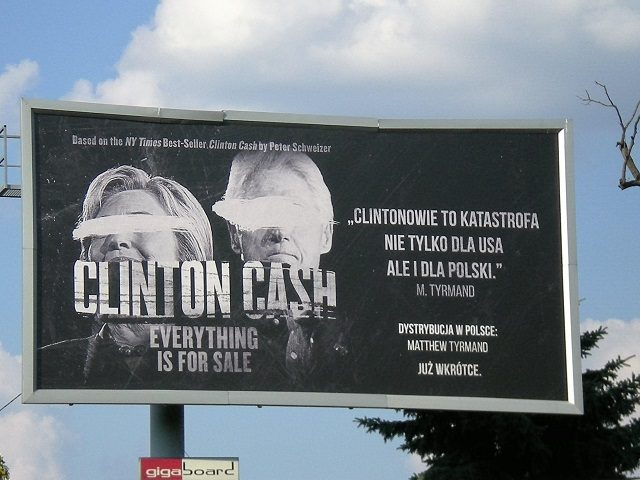Just one day after the global premiere of Clinton Cash, Hans Westberg, the embattled CEO and president of telecoms company Ericsson, stepped down as the head of the Swedish wireless equipment maker.
Though the telecom giant’s announcement to remove Westberg is not confirmed as a direct result of the film’s online popularity, the company’s timing is an odd coincidence.
The New York Times best-selling book Clinton Cash, authored by Government Accountability Institute President and Breitbart Senior Editor-at-Large Peter Schweizer, highlighted that Ericsson — on Westberg’s watch — had come under heavy fire for selling telecom equipment to countries that were considered state sponsors of terrorism by Hillary’s State Department.
The company had received a letter in late 2010 from the Securities and Exchange Commission, warning it about the sells to oppressive governments. U.S. diplomatic cables noted that State Department officials had “regularly and increasingly” raised Ericsson’s transgressions with the Swedish foreign minister.
In June 2011, the State Department began drafting a list of specific goods and services that should be covered under expanded sanctions that were to be imposed on Iran and other state sponsors of terrorism.
Meanwhile, Ericsson decided to pay Bill Clinton more money than he had ever been paid for a single speech: $750,000. In the previous decade, Ericsson had never sponsored a speaking engagement for either Hillary or Bill Clinton.
During his November 12, 2011 speech at a telecom conference in Hong Kong, Bill Clinton spoke in general terms about the positive role telecom plays in our lives. One week later, on November 19, the State Department unveiled its new sanctions list for Iran. Telecom was not on the list.
In an interview last month on Fox Business network, Schweizer said that indeed, “seven days after [Bill Clinton] got paid, Hillary Clinton’s State Department issued a statement that said we’re going to ask the company to police themselves.”
In April 2012, President Obama signed an executive order imposing sanctions on telecom sales to Iran and Syria. But those sanctions did not cover Ericsson’s work in Iran.
Again, all of this has been laid out in meticulous detail in Clinton Cash.
Clinton Cash the movie exposes the disturbing pattern, as detailed in Ericsson’s case, of record-high speaking fees to Bill Clinton and donations to the Clinton Foundation from foreign contributors, which conspicuously coincided with favors for Clinton cronies while Hillary Clinton was secretary of state.
Ericsson Chairman Leif Johansson listed increased competition as the reason for Westberg’s departure and said the board had decided to find a new leader “to drive the next phase in Ericsson’s development.”
However, as with so many of the companies who were financially supportive of the Clinton Foundation, Ericsson paid Bill Clinton a massive amount of cash only to find U.S. government actions being made in its favor.
Follow Jerome Hudson on Twitter: @jeromeehudson

COMMENTS
Please let us know if you're having issues with commenting.